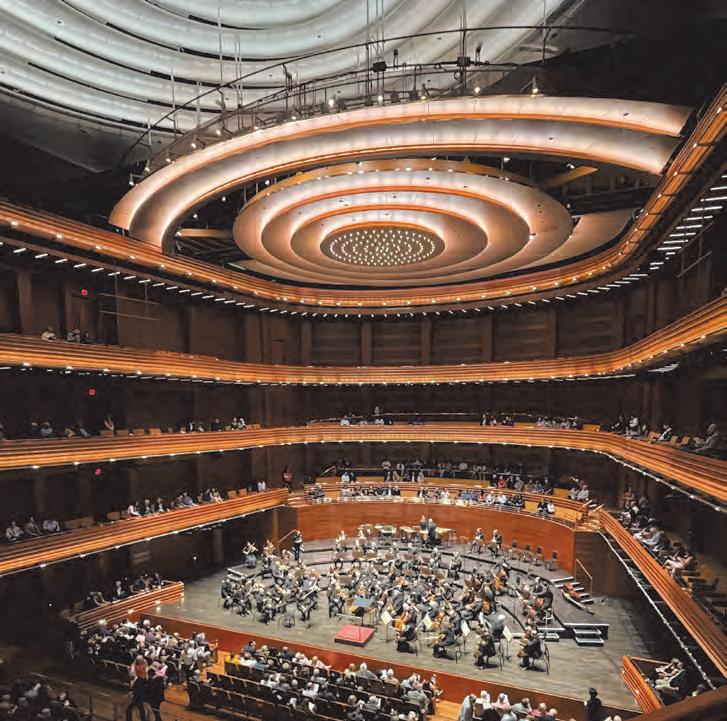
7 minute read
DOWN TO PARTY
School board races are traditionally nonpartisan — a new proposal in the House would change that
Making Disney’s theme parks magical is laborintensive, but workers can’t pay their bills with magic. Many workers are fighting for better pay and other job benefits because they love their jobs and want to stay in them — but also want to be able to do them without falling behind on bills or skipping meals in order to keep family members fed.
A recent survey by one of the unions found that 69% of local tourism workers surveyed last year said they haven’t had the money to pay rent or mortgage. Sixty-two percent say they have less than $100 in savings, and 45% reported skipping meals.
Meanwhile, the Disney Parks’ division, which accounted for a third of the company’s revenue and more than half its operating income over the first nine months of last year, made $28 billion in revenue in 2022. The company found the money to pay CEO Bob Iger $27 million, and to say goodbye to former CEO Bob Chapek, who was fired in November, with a $20 million severance package. During the 2020 election cycle, the “woke” corporation (so-called by Florida Gov. Ron DeSantis) also found the money to give DeSantis’ re-election campaign $50,000 in March 2021, and another $50,000 two years before that.
Granted, that was before DeSantis directed Florida’s GOP-controlled legislature to pass legislation approving a state takeover of Disney’s Reedy Creek special tax district, created in 1967, which essentially serves as a fully fledged government. The state has since solidified a plan for how to carry that takeover out.
This latest offer came right after Walt Disney Co. announced it would lay off 7,000 workers — 3% of its workforce — as its movie and TV streaming efforts continue to lose the company money. But frontline workers at Disney theme parks in Orlando are expected to be spared.
“You don’t save the company money by cutting your lowest-paid workers,” Eric Clinton, president of Unite Here Local 362, told the Orlando Sentinel mschueler@orlandoweekly.com
This disappointing news for the thousands of workers waiting for a serious proposal from Disney also comes on the heels of Universal Orlando’s announcement last week that they will increase their minimum wage for workers up to $17, effective June 4, 2023.
Sodexo, a multinational corporation that contracts food service work at the Orange County Convention Center, recently agreed to raise base pay for workers there from $13 to $18 this year, through an agreement with their union.
According to the STCU, Disney World workers plan to hold public actions in the near future “to bring light to the plight of Cast Members struggling to survive the devastating increase in the cost of living.” Hollis, the STCU president, told Orlando Weekly no date has been set yet for those actions.
Their previous contract, since extended, includes a no-strike clause. It’s unclear at this time what the workers might be planning, although the unions have rallied to bring attention to their demands in the past.
The Florida House last week began inching forward measures that would make school-board elections partisan contests and continue to shorten board members’ term limits.
The Republican-controlled House Choice & Innovation Subcommittee supported putting a proposed constitutional amendment (HJR 31) on the 2024 ballot about changing to partisan school-board races. If the proposal is ultimately approved by the Legislature and voters, Florida school-board candidates could run with party affiliations starting in 2026.
The state Constitution currently requires school-board races to be nonpartisan.
“This is not about, at least for me, advancing the cause of one political party over another,” said Rep. Spencer Roach, a North Fort Myers Republican who is the proposal’s sponsor. “But for me it’s about transparency, and I simply believe that we have an obligation to give voters as much information about a candidate as possible, and let them make a decision about vetting a candidate.”
Democrats on the panel voted against the measure, with some pointing to an intensified focus on school-board politics in recent years. Rep. Angie Nixon, D-Jacksonville, called for “freedom away from party politics” when it comes to school boards.
“I believe this bill is not about transparency at all. This bill is about making our school-board elections and our school boards more contentious, more like D.C., which y’all [Republicans] honestly always try to oppose,” Nixon said. School-board elections last year drew heavy attention, with Florida Gov. Ron DeSantis taking the rare step of endorsing a slate of conservative school-board candidates. Many of those candidates went on to win and, in some cases, flipped boards to conservative majorities.
The subcommittee also gave the go-ahead to a bill (HB 477) that would cap school board members’ terms at eight years. The measure comes after lawmakers last year elected to limit board members to 12-year terms.
Rep. Alex Rizo, a Hialeah Republican who is sponsoring the bill, argued that shortening school-board terms would have multiple benefits.
“Number one, it would foster regular open-seat elections. Number two, encourage independence by the school board, as term limits will regularly sever relationships that grow between special interests and incumbent board members,” Rizo said.
But Chris Doolin, who represents the Small School District Council Consortium, said the proposal would usher in a “restrictive regulation” that will reduce the pool of candidates.
“This bill imposes an unnecessary government regulation. This bill does not support maximum choice,” Doolin said. — Ryan Dailey, News Service of Florida news@orlandoweekly.com


BY SETH KUBERSKY
It sometimes seems that our city offers infinite opportunities to be entertained, but precious few places to experience true art. Happily, that dyspeptic perspective was dispelled last weekend by a pair of performances that proved quality culture is alive and well, and living in downtown Orlando.
On Friday, Feb. 17, the Dr. Phillips Center’s Great American Orchestra series continued with a special appearance by the Philadelphia Orchestra, under the baton of internationally renowned conductor Nathalie Stutzmann. I’ve been vocal about my criticisms of the “acoustically perfect” Steinmetz Hall before, but this concert showed the year-old venue at its very best. The program began with Brahms’ Violin Concerto in D major, featuring Grammy-winning violinist Gil Shaham; his elfin exuberance while dexterously executing the notoriously difficult cadenza (sans seat or sheet music) earned the evening’s first of several standing ovations.

After intermission, Dvorak’s familiar Symphony No. 9 “From a New World” received an equally rousing rendition, with Stutzmann’s subtly restrained conducting becoming more boldly expressive through the languid Largo movement and into the dramatic Allegro con fuoco finale. In fact, the only flaw in this magnificent presentation was the one it exposed in the Steinmetz’s celebrated acoustic configuration, which includes seating audience members behind and above the orchestra: Just as you can clearly hear every toot, whistle and plunk from the stage, every cough, whisper and phone alarm from the peanut gallery carries across the hall with crystal clarity. Until additional sound dampening is installed to muffle the din from patrons, perhaps every concert here should simply be billed as an audience participation affair.
As wonderful as it was to start my weekend with a world-class import, my Saturday night spent with Kangagirl’s production of Will Eno’s Middletown was even more special, because it showed that Orlando’s homegrown talent is equal to the best in any city. The new Fringe ArtSpace in Church Street’s former Mad Cow Theatre has been active nonstop since debuting with January’s Winter Mini-Fest, and its stages have already hosted premieres from Blue Star’s VarieTease and Phoenix Tears Productions, as well as events and seminars with Whiskey Theatre Factory and Meka King’s SJM Creative. But watching Middletown was the moment I became convinced that Fringe ArtSpace can be an important positive force for platforming the kind of challenging, sophisticated theater that other venues may be deem too unconventional or noncommercial to take a chance on.
Much of the credit for the transcendent journey that is Middletown must go to director David Lee, who won awards for his performances of Eno’s solo shows at the Fringe. Lee has wanted to direct Middletown since discovering the script in 2010, and he told me after the show that he submitted it for ArtSpace’s opening season because he thought “the play would be an amazing piece of theatrical sage for the space and for the community,” citing members of his cast who had been “wounded by the previous incarnation of the space.”
“It’s just amazing to have them back in the space, full circle, ” Lee said.
To populate the close-knit community of Middletown — which is most easily summarized as a surrealist self-aware Our Town scripted by Samuel Beckett — Lee called upon many of his longtime friends (and mine), assembling the most overqualified acting ensemble Orlando has seen in ages. Joe Swanberg’s assertively obtuse police officer, Anitra Pritchard’s kindly (but kinda spooky) librarian, and Daniel Cooksley’s self-destructive shaman are just a few of the fractured, friendly people that you’ll meet in this neighborhood, which also includes Janine Klein, Megan Borkes, Robert Laurita, Nick Rodriguez and Barry G. White in brief but memorable moments.
In the middle of Middletown is Felichia Chivaughn as Mary Swanson, a newly arrived mother-to-be with an absent husband who forms a friendship with Michael Marinaccio’s John Dodge, a hard-luck handyman. Marinaccio gives a masterclass in dramatic range, from charming, childlike enthusiasm in the early scenes, to agonizing physicality in the (spoiler alert) heartrending ending. But it’s Chivaughn’s beatific calm and grounded serenity — despite being surrounded by a swirling storm of non sequiturs and shattered fourth walls — that makes her Mary the “regular human being” who truly holds Middletown together. skubersky@orlandoweekly.com
Every element of Middletown’s production contributes to its intense emotional — even spiritual — impact, from Matt Lynx’s haunting original live score and Kyla Swanberg’s timeless costumes to Lee’s abstract set of floating windows, backlit in moonlight by Amy Hadley.
But Middletown is ultimately not about its visuals — it’s Eno’s powerful, perplexing poetry that this peerless cast gorges on with glee, proving that “making sounds with your mouth” is among the highest things humans can do.
And please don’t be intimidated out of seeing one of the best shows in years because I’ve made it sound too highbrow; just like Waiting for Godot, Middletown is often laughout-loud funny, and sometimes sounds like a SAK improv skit that’s gone off the rails. Fair warning, though: You’ll still want some tissues for the finale.
Following two first-class outings in a row, I’m officially eager to return downtown for more than booze and Broadway, but Orlando’s nightlife needs to meet arts-loving audiences halfway. After a performance, there’s currently nowhere available within walking distance to sit and talk over affordable food or drinks, without navigating aggressive crowds along Orange Avenue.
If the city really wants to shift the vibe, a couple of late-night venues catering to the culture crowd would be a smart start.








